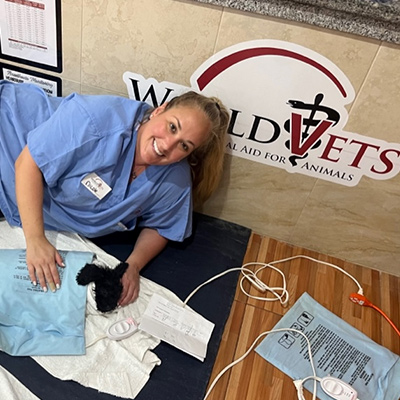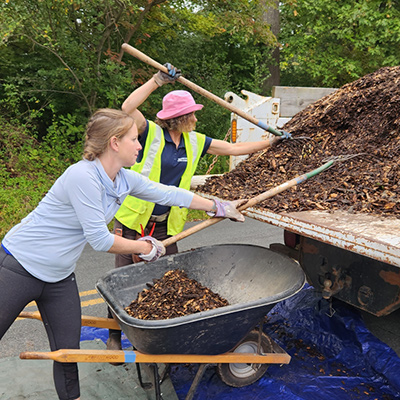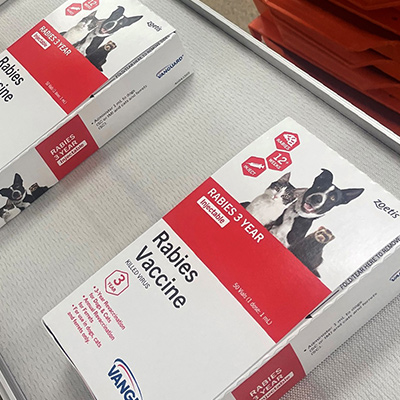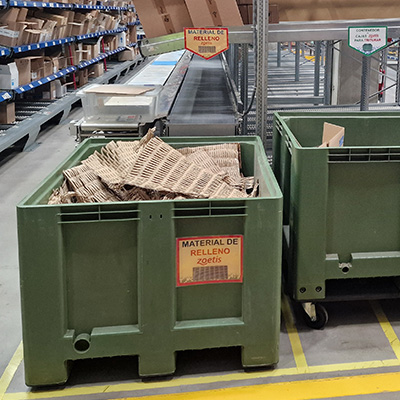
Case Studies
2023 Case Studies
Communities
Protecting Pets and Wildlife in the Galapagos Island

Nicole Roecker, Territory Account Business Manager at Zoetis, combined her love for animals and travel by volunteering in the Galapagos Islands with World Vets, an international veterinary aid organization dedicated to bringing veterinary services to underserved areas of the world.
In the Galapagos Islands, World Vets operates a full-service veterinary clinic on San Cristobal. As non-native species, pets like cats and dogs pose a risk to the many endangered species living on the islands such as the giant tortoise and the marine iguana. Spay and neuter campaigns in the Galapagos help encourage responsible pet ownership and protect the delicate ecosystem.
During her three-day trip, Nicole and a team of volunteers provided medical care, including spaying/neutering animals, treating injuries, and supporting the community. “One of the reasons I got into the animal health industry is that I like to help those who don't have a voice," said Nicole. Zoetis' support for volunteering allows colleagues to pursue their passions while giving back to local communities.
Cultivating a Greener Future at Willowwood Arboretum

he Zoetis Petcare Brand Marketing Team recently volunteered at Willowwood Arboretum in Chester Township, New Jersey. Willowwood, set on 130 acres of farmland, is an important public park, community meeting place and event venue that relies heavily on volunteers to maintain the gardens and meadows year-round. Despite rain and muddy conditions, Zoetis colleagues planted over 400 perennials and other plants within the park.
“It was rewarding for the team to give back to the community using volunteer time off as well as spend the day getting to know colleagues in a different light. Our managers were very supportive of the team utilizing this benefit," said Brittany Bewalder, Lead, Core Brands at Zoetis. Zoetis' volunteer time off policy provides colleagues with teambuilding opportunities while supporting local communities.
Empowering Veterinary Technicians During National Vet Tech Week

Since 1993, National Veterinary Technician Week has been celebrated annually during the third week of October to honor the vital role of veterinary technicians. In 2023, the Kansas City Zoetis Petcare team supported clinics and hospitals in acknowledging their technicians.
The Zoetis team emphasized well-being by highlighting Project WAG (Wellbeing and Growth), a Zoetis initiative to support veterinary professionals' mental health. They put together over 160 WAG Bags, which contained self-care items, resources about Project WAG and contact details for Not One More Vet (NOMV), a non-profit organization that supports veterinary professionals’ mental health.
This initiative recognized the importance of vet techs and underscored Zoetis' commitment to customer satisfaction.
Planet
GMS Site Marks First Year Using 100% Renewable Electricity

In a significant stride towards sustainability, Zoetis celebrated the completion of its first year utilizing 100% renewable electricity at its Lincoln site in eastern Nebraska in 2023. Through proactive measures and strategic partnerships, in 2023 all of Lincoln’s ~55,000 megawatt hours electricity consumption came from renewable resources – resulting in a reduction of about 25,000 metric tons of greenhouse gas emissions.
To ensure the validity of its renewable energy usage, the Lincoln site purchased renewable electricity certificates (REC's) from Lincoln Electric System that provides the site's electricity generated by nearby wind, solar and hydro power plants.
This initiative aligns to Zoetis’ strategic priorities – to advance sustainability in animal health for a better future – and aligns to our goal to be carbon neutral by 2030. To date, more than 30% of Zoetis manufacturing sites operate with 100% renewable electricity.
GMS Suzhou Bio Site in China Completes Rooftop Solar Project

Around the world, Zoetis is taking actions to address climate change, a significant global issue with wide ranging impacts. One of the ways we do this is by reducing our greenhouse gas emissions by using renewable electricity. In China, our Global and Manufacturing and Supply (GMS) biologicals site in Suzhou recently completed the installation of rooftop solar panels to generate electricity for the site.
The sprawling rooftop installation made of 2,700 photovoltaic panels, covering 14,300 square meters of space, produces around 1,500 megawatt hours of electricity per year, supplying more than 10% of the site's electricity demand. CO2e abatement, or the amount of carbon dioxide emission reduced by switching to solar power, is expected to be greater than 900 metric tons per year.
Zoetis' adoption of rooftop solar panels at its Suzhou site represents a significant step towards reducing greenhouse gas emissions and promoting sustainability.
Switching from Plastic to Paper

Caring for animals means caring for the planet we share. At our Lincoln manufacturing site in Nebraska, plastic clamshells have been replaced with paperboard boxes for Vanguard Rabies vaccine distributed in the U.S. market. This follows our earlier success of using paperboard for the same vaccine distributed in the South Korean and Japanese markets.
The new sustainable packaging is utilized across three variants of the vaccine, which have an estimated annual production of 12 million vials per year into 2024. The switch, which was rolled out in 2023, resulted in cutting PVC plastic use by an estimated 8.0 metric tons and overall packaging by an estimated 2.5 metric tons annually.
This change will aid in reducing the amount of plastic waste that enters landfill.
Shifting Towards Sustainability Through Packaging

In 2023, Zoetis’ distribution process in Portugal successfully shifted from using plastic air pillows to re-utilized carton as dunnage materials.
The shift to re-utilized cartons represents a pivotal move in the team’s ongoing commitment to a more sustainable distribution process. The dedication of our colleagues in reimagining our packaging to reduce its environmental impact, while maintaining product safety and quality enables us to reduce our environmental footprint and advance our sustainability goals.
This switch offers benefits such as:
- Reduced Environmental Impact: The elimination of plastic air pillows significantly reduces plastic waste and lessens our carbon footprint.
- Closed Recycling Loop: Recycled cartons are not only environmentally friendly, but they also promote a circular economy by reusing materials that might otherwise go to waste.